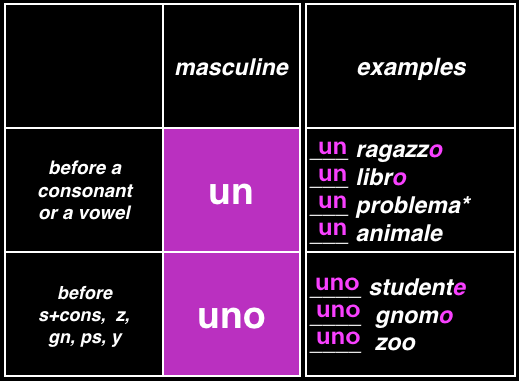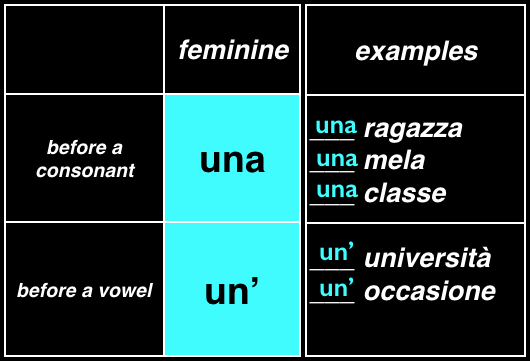Italian Nouns: Indefinite Articles
- The Gender of Italian Nouns: Masculine & Feminine
- Italian Nouns: Singular and Plural
- Definite Articles
- Indefinite Articles
Indefinite Articles in Italian
After learning about singular and plural nouns in Italian, you can now move on to indefinite articles. Articles are the small words that go in front of nouns, and there are two types: definite and indefinite. Indefinite articles (the English - a or an) are the subject of this page. If you'd like to learn about definite articles (the English - the) follow this link.
Italian Nouns: Indefinite Articles:
Watch the following video to learn the rules for using indefinite articles in Italian:
*There are exercises at the end of the video to reinforce what you have learned.
There are 4 different indefinite articles in Italian: 2 used with masculine nouns and 2 for feminine nouns.
Here is a chart of the masculine indefinite articles in Italian:

In addition a noun's gender, the article that you put in front of the noun is determined by the first letter(s) of the word. If a word is masculine singular and starts with a consonant or vowel the article will be un as in un ragazzo or un animale. In contrast to the masculine singular nouns that start with a vowel and take the definite article l', the indefinite article un without an apostrofe is used in front of the same nouns.
The article uno goes in front of masculine singular words that start with s + a consonant, z, gn, ps, pn, and y, as in uno studente or uno zoo.
*Note that problema is masculine despite its typically feminine ending. Words derived from Greek that end in -ma, like emblema, programma, and dramma look feminine, but are actually masculine.
Here is a chart of the feminine indefinite articles in Italian:

If a noun is feminine singular and starts with a consonant the article will be una as in una ragazza. Before a feminine noun that starts with a vowel, un' is used as in un'università. Note the use of un' before a feminine singular noun starting with a vowel and un (without the apostrofe) before a masculine singular noun starting with a vowel.
*-à is a common feminine ending for nouns in Italian. Other examples are città and libertà it doesn't change in the singular or plural.